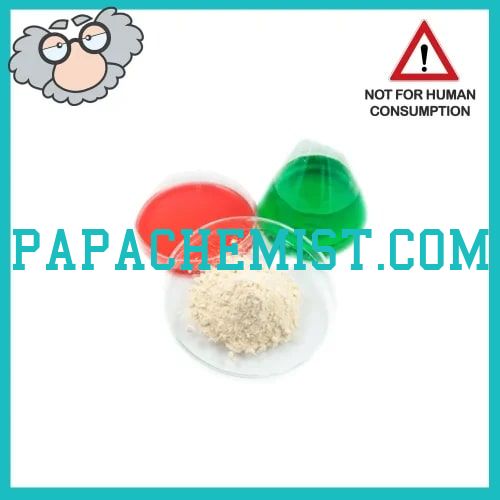3-Me-PCP Arylcyclohexylamines
Stock: AVAILABLE [26/04/2025]
GET MORE BANG FOR YOR BUCK:
Pay Less, BUY MORE!
| 1 to 2 | EUR 47.95 /gram | Save 0% |
| 3 to 4 | EUR 43.16 /gram | Save 10% |
| 5 to 9 | EUR 38.36 /gram | Save 20% |
| 10 to 24 | EUR 31.17 /gram | Save 35% |
| 25 + | EUR 26.37 /gram | Save 45% |
Buy 3-Me-PCP Online
3-Me-PCP is a substance that is only sold for research purposes and is therefore not intended for consumption.
3-Me-PCP maintains its stability for up to 2 years when stored in the correct environment. 3-MePCP Is intended for research purposes and not for consumption. It is therefore important that the product is kept out of the reach of children and pets.
We offer good quality research chemicals for a fair price. Your order will be shipped every day within 24 hours. Therefore, order 3MePCP safely and quickly via PAPACHEMIST.COM!
3-Me-PCP properties
Synonym : 3-methylphencyclidine
CAS Number : 91164-58-8
Formula : 1-[1-(3-methylphenyl)cyclohexyl]-piperidine
Molar mass : 292.2 g/mol
Purity : >97%
What is 3-Me-PCP?
3-Me-PCP, also known as 3-Methyl-PCP, is a chemical compound that belongs to the class of substances known as arylcyclohexylamines. It is a derivative of PCP (phencyclidine) and has some structural similarities with other dissociative anesthetics.
The compound was synthesized and developed by researchers who wanted to investigate the effects of changes in PCP structure. By introducing a methyl group at a specific location, they wanted to create a new compound with potentially unique properties and pharmacological effects.
The synthesis of 3-Me-PCP involved a series of carefully controlled chemical reactions starting from suitable precursor compounds. The researchers used various synthetic techniques to manipulate the molecular structure and obtain the desired product. Purification methods were then used to isolate the compound in its pure form.
After synthesis, 3-Me-PCP was extensively tested to determine its pharmacological properties. This included laboratory experiments and studies in a controlled environment, with the aim of understanding its effects on the central nervous system and its potential applications in scientific research.
The research into 3-Me-PCP contributes to a better understanding of dissociative anesthetics and their interaction with the brain. Through research, scientists aim to uncover the mechanisms of action, potential therapeutic applications, and potential risks of these compounds.
As with any research chemical, it is critical to handle 3-Me-PCP responsibly, observe safety protocols, and follow legal and ethical guidelines. The responsible exploration of such compounds can advance scientific knowledge and potentially lead to advances in several fields, including medicine, neuroscience and pharmacology.
How did 3-Me-PCP come about?
The origins of 3-Me-PCP can be traced back to the field of medicinal chemistry and the investigation of new compounds with potential pharmacological effects. Researchers and scientists were interested in studying the structure-activity relationships of phencyclidine (PCP), a dissociative anesthetic known for its unique effects on the central nervous system.
In their quest to understand the underlying mechanisms and explore new variations of PCP, they attempted to make changes to its molecular structure. By replacing a methyl group at a specific location, they hoped to create a derivative that would exhibit different properties than the original compound.
The synthesis of 3-Me-PCP involved a series of carefully designed chemical reactions guided by knowledge of the principles of organic chemistry. Starting from suitable precursor molecules, the researchers used synthetic techniques such as condensation, reduction and purification to obtain the desired compound.
After synthesis, 3-Me-PCP underwent rigorous testing and evaluation. Laboratory experiments were conducted to investigate its pharmacological effects, such as its interaction with receptors in the brain and its potential therapeutic applications. Researchers used specialized equipment and methodologies to measure efficacy, selectivity and other relevant parameters.
The synthesis and research of 3-Me-PCP were carried out under controlled laboratory conditions, adhering to strict regulations and ethical guidelines. The compound was not intended for human consumption but for scientific research. Its controlled availability ensured that it was only used in an authorized environment by qualified professionals.
The research on 3-Me-PCP, like other research chemicals, contributes to the broader field of pharmacology and drug discovery. It provides valuable insights into the structure-activity relationships of dissociative anesthetics and helps expand our understanding of their potential applications.
Ultimately, the origins of 3-Me-PCP lie in the curiosity and scientific investigation of researchers seeking to expand our knowledge and improve our understanding of pharmacologically active compounds.
Hazard statements
3-Me-PCP can cause respiratory irritation.
3-Me-PCP can cause eye irritation.
Discharging research chemicals into the environment is prohibited.
3-Me-PCP IN CONTACT WITH EYE: Rinse eyes gently with water for five minutes. Remove the contact lenses if possible.
3-Me-PCP IN CONTACT WITH SKIN: Wash skin with soap and water.
AFTER INHALATION OF 3-Me-PCP: Remove the victim to fresh air and keep the victim in a position that makes breathing easy.
Last stock update: April 2025 - Tags: buy online 2025, Buy 3-Me-PCP online with stealth shipping. Lizard Labs, Chems.eu, Professor.nl, buybestrc.com, Legit research chemicals vendor. Worldwide shipping with stealth parcel. EU stock. Sending to UK, USA, United Kingdom, Australia, New Zealand, France, Spain, Germany, United States, Sweden, Norway, Finland shipping, undetectable parcel, Buy research chemicals with Visa credit card Paypal bitcoin from Europe. order 3-Me-PCP, 3-Me-PCP (3-methylphencyclidine). You can find out "how to buy 3-Me-PCP and other research chemicals online" on www.papachemist.com (formerly known as professor.nl)
Please read Terms & Conditions before making order.
Interested in Wholesale/Bulk order? Apply now
 USD
USD GBP
GBP CAD
CAD AUD
AUD